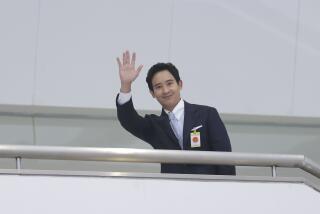Thais Hand Majority to Anti-Military Coalition : Election: Angry voters move away from pro-army parties in wake of crackdown on democracy movement.
BANGKOK, Thailand — Four months after Thailand was shaken by the army’s crushing of pro-democracy demonstrations, angry voters Sunday gave a coalition of anti-military parties a slender majority in the next Parliament.
Official returns gave the four major anti-military parties, dubbed “angels” by the Thai press, a total of 185 seats in the 360-seat Parliament, while the pro-military “devil” parties trailed well behind.
The returns indicated a small realignment of forces away from military-dominated parties in favor of the middle-of-the-road Democracy Party headed by lawyer Chuan Leekpai, which nearly doubled its strength in Parliament. By Thai tradition, Chuan, as the leader of the party with the most seats, will be given the first opportunity to form the next government.
Chamlong Srimuang, an ascetic Buddhist who led the pro-democracy demonstrations in confrontation with the military authorities earlier this year, surprisingly failed to significantly increase support for his Power of Virtue party, apparently blamed by the voters in this gentle society for provoking the violence.
The balloting Sunday, which was marked by traditional vote buying in rural areas and scattered violence that left at least seven dead, was the second election held in Thailand this year.
Voting in March gave a thin majority to five pro-military parties, but they produced an embarrassment when their first candidate for prime minister was discovered to be on a U.S. government list of suspected narcotics dealers. The pro-military coalition then appointed as prime minister Suchinda Kraprayoon, a former general who had not been a candidate in the election.
With burgeoning support from Thailand’s upwardly mobile middle class, democratic forces took to the streets and demanded the ouster of Suchinda, who led a military coup against Thailand’s last elected prime minister in February, 1991.
Although Suchinda managed to cling to power for three months, support collapsed when the armed forces opened fire on pro-democracy demonstrators in May, killing scores of mostly young demonstrators and wounding hundreds of others. After Thailand’s respected king intervened to end the violence, Suchinda resigned.
Suchinda was replaced by Anand Panyarachun, a businessman and former diplomat who had served as interim prime minister after the 1991 coup. Sensing the new mood in the country, Anand demoted the military commanders responsible for giving the orders to open fire on the demonstrators and began purging military officials from their traditional posts in civilian agencies such as Thai International Airlines.
The military has pledged to accept the results of Sunday’s voting, but there were concerns expressed that if the victor had been either Chamlong or another anti-military candidate, Chavalit Yongchaiyudh, the army might have bolted out of its barracks. The army has staged 19 coups in the last 60 years.
Because no party has an overall majority in Parliament, the composition of the next government will be subject to complex negotiations between the Democrats and their coalition partners. The maneuvering is expected to last as long as a week.
“If possible, I want the old allies,” Chuan said Sunday night, referring to his partners in the anti-military alliance. “I cannot say now whether I am ready to be prime minister. It depends on supporting voices.”
Chuan, 54, has served variously as minister of health, commerce, agriculture, justice and education in a political career dating back to the 1970s. He was accused of being indecisive because of his lukewarm support for the anti-Suchinda protests in May, but he was able to capitalize on popular discontent with Chamlong and other hard-line opponents of the army.
Chavalit, a former army commander who angered the military by his opposition, said Sunday night that his New Aspiration Party will join the coalition but that he will refuse to take a ministerial post himself.
Chart Thai, a traditionally pro-military political party, actually finished in second place behind the Democrats, but leaders of the four-party anti-military opposition said they will stick together to form the new government.
Thailand’s smorgasbord of political parties tends to be non-ideological, and the country is expected to continue its pursuit of a liberal economy and a pro-Western foreign policy under the next government.
A watchdog group called Poll Watch said before the voting that it had received more than 3,000 complaints of campaign violations in the days preceding Sunday’s vote. They included charges that one candidate had treated male voters to a sex romp in a massage parlor and other allegations of vote buying, a persistent problem in poverty-stricken rural areas.
The new government will face the enormous challenges of making structural changes to Thailand’s political system to make permanent the reforms initiated under the Anand administration.
They include not only a new role for the military but a festering problem with bureaucratic corruption, which has blossomed as Thailand’s economy set world growth records, further accentuating the gap between rich and poor.
Thai businessmen hope that the resumption of elected civilian rule will help smooth markets that have been roiled by upheaval this year.
More to Read
Sign up for Essential California
The most important California stories and recommendations in your inbox every morning.
You may occasionally receive promotional content from the Los Angeles Times.










